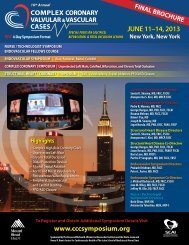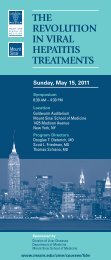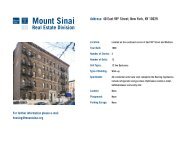Martha Stewart Center for Living Newsletter - Mount Sinai Hospital
Martha Stewart Center for Living Newsletter - Mount Sinai Hospital
Martha Stewart Center for Living Newsletter - Mount Sinai Hospital
Create successful ePaper yourself
Turn your PDF publications into a flip-book with our unique Google optimized e-Paper software.
Brookdale Department of Geriatrics<br />
and Adult Development<br />
The <strong>Mount</strong> <strong>Sinai</strong> School of Medicine<br />
One Gustave L. Levy Place<br />
Box 1070, New York, NY 10029<br />
Tel. 212-241-5561, Fax 212-860-9737<br />
Albert L. Siu, MD, MSPH<br />
Ellen and Howard C. Katz Chairman’s Chair<br />
Brookdale Department of Geriatrics<br />
and Adult Development<br />
<strong>Mount</strong> <strong>Sinai</strong> School of Medicine<br />
Director of the New York Geriatric<br />
Research Education and Clinical <strong>Center</strong> at<br />
the James J. Peters VA Medical <strong>Center</strong><br />
Rosanne M. Leipzig, MD, PhD<br />
Vice Chair <strong>for</strong> Education<br />
Gerald and Mary Ellen Ritter Professor of<br />
Geriatric Medicine<br />
Diane E. Meier, MD<br />
Director, <strong>Center</strong> to Advance Palliative Care<br />
Director, Hertzberg Palliative Care Institute<br />
Catherine Gaisman Professor of Medical Ethics<br />
R. Sean Morrison, MD<br />
Vice Chair <strong>for</strong> Research<br />
Director, National Palliative Care Research <strong>Center</strong><br />
Director of Research,<br />
Hertzberg Palliative Care Institute<br />
Hermann Merkin Professor of Palliative Care<br />
Audrey K. Chun, MD<br />
Medical Director, <strong>Martha</strong> <strong>Stewart</strong> <strong>Center</strong> <strong>for</strong> <strong>Living</strong><br />
Beatriz Korc, MD, PhD<br />
Director, Clinical Services<br />
Co-Director, Mobile ACE Unit<br />
Jeffrey Farber, MD<br />
Co-Director, Mobile ACE Unit<br />
Marilyn W. de Leo<br />
Director, Development<br />
One Gustave L. Levy Place, Box 1049/1050<br />
New York, New York 10029<br />
212-659-1599<br />
marilyn.deleo@mountsinai.org<br />
<strong>Martha</strong> <strong>Stewart</strong> <strong>Center</strong> <strong>for</strong> <strong>Living</strong><br />
Phyllis and Lee Coffey Geriatrics Associates<br />
1440 Madison Avenue at 99th Street<br />
New York, New York 10029<br />
212-659-8552<br />
www.mssm.edu/patient_care/coffey<br />
Lilian and Benjamin Hertzberg<br />
Palliative Care Institute<br />
One Gustave L. Levy Place, Box 1070,<br />
New York, New York 10029<br />
www.mssm.edu/palliative<br />
212-241-1446<br />
Written and Edited by Rosemary L. McGinn<br />
Graphic Design by <strong>Martha</strong> L. Quintero<br />
“Geriatrics <strong>for</strong> non-geriatricians”<br />
A revolutionary new way to<br />
pass the torch<br />
America’s supply of geriatricians is dwindling<br />
even as the over-60 population is set to skyrocket<br />
over the next decade. But the challenges of caring<br />
<strong>for</strong> the aging go beyond quantity: these “new<br />
seniors” will look very different from those of<br />
decades past. Rosanne M. Leipzig, MD, PhD, Vice<br />
Chair <strong>for</strong> Education of the Brookdale Department<br />
of Geriatrics and Adult Development, explains: Rosanne M. Leipzig, MD, PhD<br />
“We’ve never had an older generation like this<br />
one, or the next one. People didn’t make it to this age, living a third of<br />
their lives in retirement.” <strong>Mount</strong> <strong>Sinai</strong> is leading the way in crafting<br />
creative strategies to trans<strong>for</strong>m patient care during and beyond these<br />
changing times.<br />
The first and most creative<br />
<strong>Mount</strong> <strong>Sinai</strong> teaches more people about geriatrics than any other medical school in the<br />
country. Although it hosts one of the country’s top geriatrics fellowship programs, most<br />
of <strong>Mount</strong> <strong>Sinai</strong>’s “students” of geriatrics are not geriatricians nor do they plan to enter the<br />
field. Instead, they are the beneficiaries of <strong>Mount</strong> <strong>Sinai</strong>’s innovative “geriatrics <strong>for</strong> the nongeriatrician”<br />
approach.<br />
That revolutionary strategy starts with the medical school. <strong>Mount</strong> <strong>Sinai</strong> is one of only a<br />
handful of medical schools in the country that require a month-long rotation in geriatric<br />
medicine <strong>for</strong> every student. Geriatrics is infused throughout the medical school experience,<br />
from the first year through the last, “from the minute they arrive”, says Dr. Leipzig. The<br />
Seniors as Mentors Program matches every incoming student with an older <strong>Mount</strong> <strong>Sinai</strong><br />
patient. Special interest groups, research projects, and a month-long clerkship integrated<br />
with eight weeks of internal medicine – all welcome students regardless of their specialty<br />
plans.<br />
The revolution continues with pioneering programs <strong>for</strong> practicing physicians, such as a<br />
unique “mini-fellowship” program that targets non-geriatricians who teach in residency<br />
programs or medical schools. As part of the program, <strong>Mount</strong> <strong>Sinai</strong> faculty mentor the<br />
participants long after they return to their regular duties at home. With 48 slots, each weeklong<br />
rotation, or session, draws applicants from all around the country and often cannot<br />
accommodate the demand. This tuition-free program is supported by a one-time, six-year<br />
grant from the Donald W. Reynolds Foundation that concludes in 2010, and the department<br />
is already working on ways to ensure its continuation.<br />
Taking the model national<br />
Dr. Leipzig is working to take this “geriatrics <strong>for</strong> non-geriatricians” approach to a national<br />
level, traveling around the country to advise other medical schools on improving their own<br />
programming. “We’re leading the charge to develop graduation competencies in geriatrics<br />
<strong>for</strong> every medical student – what every student must demonstrate when caring <strong>for</strong> an older<br />
adult.” This strategy includes methods <strong>for</strong> teaching and assessing these competencies, as<br />
well as adding relevant questions to the board exams they must pass to be licensed. The big<br />
picture entails working with national associations to develop similar competencies <strong>for</strong> all<br />
residency and fellowship programs and <strong>for</strong> practicing physicians.<br />
“Whether they plan to become ophthalmologists or orthopedists,” Dr. Leipzig adds, “all of<br />
tomorrow’s doctors will work with growing numbers of older patients, and doctors in<br />
every specialty need to be prepared.”


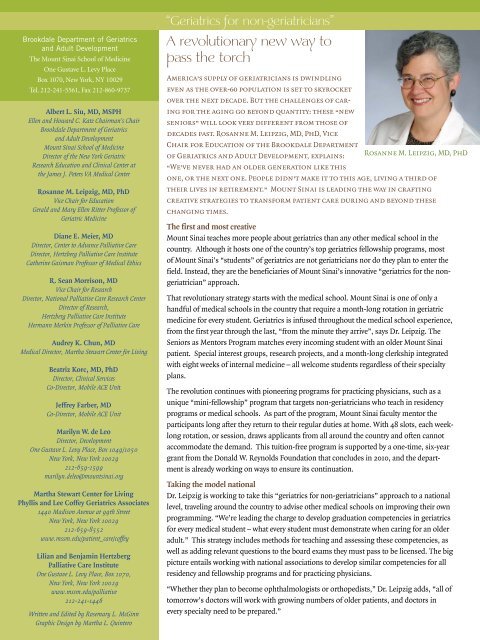
![December 2, 2012 [PDF] - Mount Sinai Hospital](https://img.yumpu.com/51092274/1/190x245/december-2-2012-pdf-mount-sinai-hospital.jpg?quality=85)
![January 21, 2013 [PDF] - Mount Sinai Hospital](https://img.yumpu.com/50916550/1/190x245/january-21-2013-pdf-mount-sinai-hospital.jpg?quality=85)
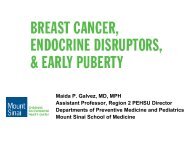
![February 3, 2013 [PDF] - Mount Sinai Hospital](https://img.yumpu.com/50584982/1/190x245/february-3-2013-pdf-mount-sinai-hospital.jpg?quality=85)
![March 18, 2012 [PDF] - Mount Sinai Hospital](https://img.yumpu.com/50462098/1/190x245/march-18-2012-pdf-mount-sinai-hospital.jpg?quality=85)
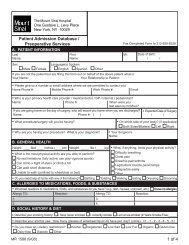
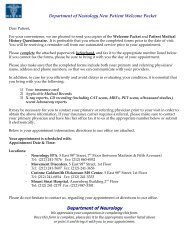
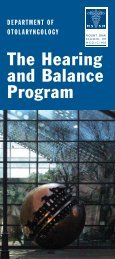
![Partners Program Guide [PDF] - Mount Sinai Hospital](https://img.yumpu.com/49411954/1/190x245/partners-program-guide-pdf-mount-sinai-hospital.jpg?quality=85)
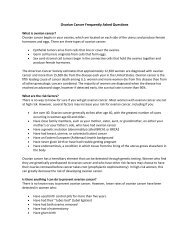
![March 19 - April 1, 2012 [PDF] - Mount Sinai Hospital](https://img.yumpu.com/48990923/1/190x245/march-19-april-1-2012-pdf-mount-sinai-hospital.jpg?quality=85)
![PGY-1 Residency Application [PDF] - Mount Sinai Hospital](https://img.yumpu.com/48577701/1/190x245/pgy-1-residency-application-pdf-mount-sinai-hospital.jpg?quality=85)
